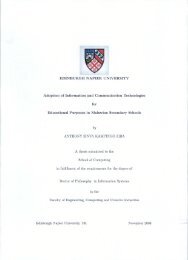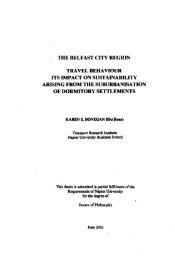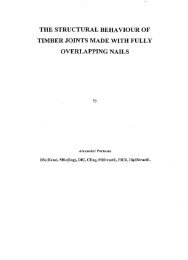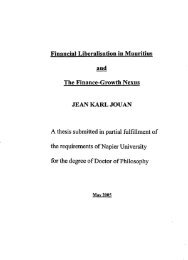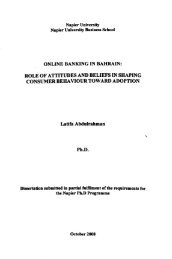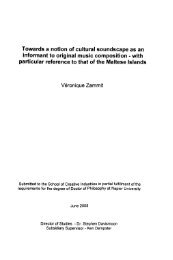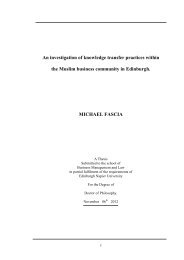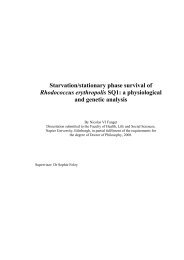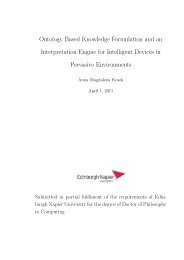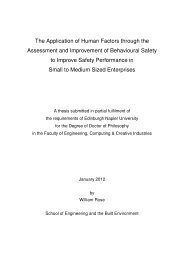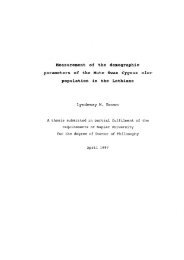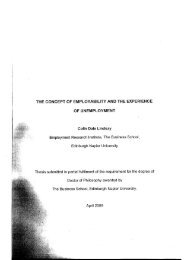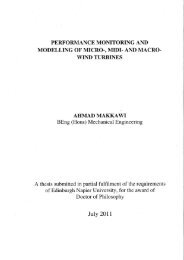The Role of Niche Tourism Products in Destination - Repository ...
The Role of Niche Tourism Products in Destination - Repository ...
The Role of Niche Tourism Products in Destination - Repository ...
Create successful ePaper yourself
Turn your PDF publications into a flip-book with our unique Google optimized e-Paper software.
<strong>in</strong>coherent mean<strong>in</strong>g <strong>of</strong> sites and experiences to tourists who visit foreign places’ (Holl<strong>in</strong>shead, 2004, p.87). He notes how little work<br />
has been done <strong>in</strong>to the held identity <strong>of</strong> places and how tourists <strong>in</strong>terpret and receive the places that they visit.<br />
Jenn<strong>in</strong>gs comments how tourism research has ‘yet to move substantially beyond the descriptive and applied nature <strong>of</strong> much if its<br />
research’ (Jenn<strong>in</strong>gs, 2001, p.5). Tribe (2007) and Chambers (2007b) note the move towards a more critical tourism approach but<br />
this is far from be<strong>in</strong>g a major paradigmatic shift (Kuhn, 1970). Key moments <strong>in</strong> the development <strong>of</strong> critical theory are highlighted<br />
(McCannell, 1976; Urry, 1990; Smith, 1977,1989; Butler, 1980; Poon, 1993) and cutt<strong>in</strong>g edge research is seen to embrace ’new<br />
discourses and practice <strong>of</strong> tourism’ and help to def<strong>in</strong>e current th<strong>in</strong>k<strong>in</strong>g <strong>in</strong> tourism research (Chambers, 2007b, p.234). After over 30<br />
years <strong>of</strong> study there is a need for tourism research to move to a more ‘knowledge-based and <strong>in</strong>formed research’ (Jenn<strong>in</strong>gs, 2001,<br />
p.5). Phillimore and Goodson also state that ‘the time has come for tourism researchers to be more self critical and more<br />
adventurous’, try<strong>in</strong>g new techniques <strong>in</strong> the field and with research participants, as well as develop<strong>in</strong>g a more reflexive approach to<br />
their work (Phillimore and Goodson, 2004, p.193). Pansiri (2006) confirms this mak<strong>in</strong>g a plea for future tourism research to <strong>in</strong>volve<br />
both positivistic and <strong>in</strong>terpretivistic philosophical traditions us<strong>in</strong>g both qualitative and quantitative data and groups <strong>of</strong> researchers<br />
rather than just <strong>in</strong>dividuals.<br />
3.3 Research Philosophy, Epistemology and Ontology<br />
<strong>The</strong> approach that my research journey has taken is one that is underp<strong>in</strong>ned by pragmatism, with a belief that mixed methods (i.e.<br />
the use <strong>of</strong> both qualitative and quantitative methodologies), or cross-method triangulation, allows for a more <strong>in</strong> depth <strong>in</strong>vestigation<br />
<strong>of</strong> some <strong>of</strong> the key issues that are reflected <strong>in</strong> the highly <strong>in</strong>terdiscipl<strong>in</strong>ary and multi-discipl<strong>in</strong>ary nature <strong>of</strong> tourism (Botteril, 2001).



